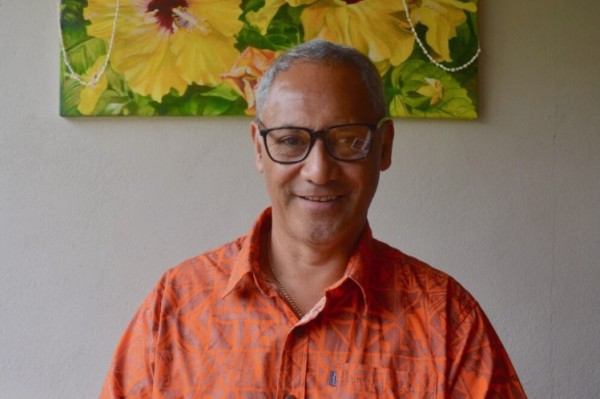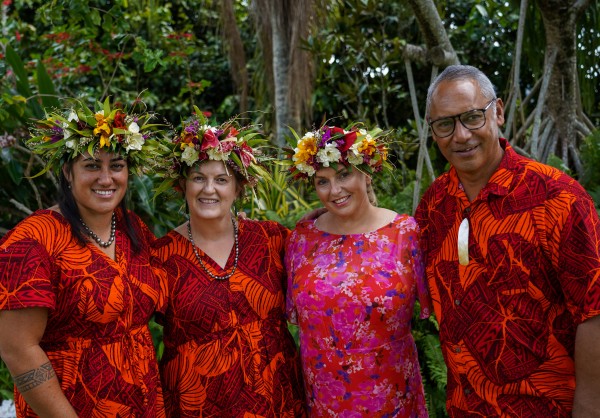With Cook Islands Māori Language Week 2024 upon us (4-10 August), VSA spoke to our Cook Islands Country Programme Advisor, James Uri-Puati, who is currently completing a Master’s thesis on the revitalisation of Cook Islands Māori.
James is a New Zealand-born Cook Islander who decided in 2003 to relocate to Rarotonga with his family and learn about his roots. With a background in education, James has worked in a variety of schools and educational institutions; in the Cook Islands, he has also carried out local, regional, and international consultancy contracts. He has worked for VSA as an advisor since 2015.

James Uri-Puati
He began a Master’s degree in 2023 after toying with the idea for several years. His thesis is a qualitative study looking at Cook Island-heritage second-language learners of Cook Islands Māori. It uses an indigenous framework based around traditional navigation practices, such as using stars and currents. ‘This can all sound a bit cosmic, but it’s very much part of who we are as Cook Islanders,’ says James. ‘Lots of Pacific cultures are really Christian, but I’m looking at the kinds of traditional frameworks that pre-date colonisation and Christianity. It’s just a huge part of our worldview.’ Overall, James hopes his thesis will relay the stories of second-language learners of Cook Islands Māori and in turn encourage and support others in their language journey.
He says he’s always been passionate about language but landed on this topic after moving to the Cook Islands and being steeped in the language. ‘I just wouldn’t have had this opportunity in a New Zealand setting,’ he says. ‘I really needed to make contact with my land.’ He notes that in Rarotonga, where he lives now, life has become quite English-dominant. But in the Outer Islands, and being in the Cook Islands in general, ‘you do hear a lot of the reo’.
Cook Islands Māori is unique for its rich wealth of dialects, which differ between regions. There are alphabet differences and genealogical differences between many of the dialects, which can make it difficult to know which one to focus revitalisation efforts on. James says there are also many second-language learners who come to Cook Islands Māori with more of a background in New Zealand Māori, complicating the picture further. ‘There’s still a traditionalist view that you’ve got to learn Aitutaki or Rarotongan Māori. But I think we’ve got to validate all those snippets of different Cook Islands and New Zealand Māori people pick up,’ he says. ‘It’s a very unique situation, but ultimately all learning and engaging with the reo is great.’

James (far right) at the VSA Cook Islands 60th Anniversary Celebration, with (from left to right) his daughter Sam Puati-Ellison, Cook Islands Programme Manager Tina Mackie, and former VSA Director of People, Finance & Workplace Kirsten McFadden.
As well as having a linguistic interest in the language, James was keen to grapple with issues around identity and culture. The Cook Islands diasporic community – primarily in New Zealand, Australia, and the United States – is around 10 times the size of the population living in the Cook Islands. Additionally, the Cook Islands has become heavily westernised since colonisation. ‘The westernised tourism industry is our major GDP unit,’ explains James. ‘And the way we deal with people, the way we run policy and government, the use of English in our largest centre – all of that is influenced by westernisation. There’s a lot of loss in it. All of that impacts who we are as Cook Islanders, so I think we need to change that perspective and do some work to gain stability in who we are as a culture and a people.’
James is excited about the perspective New Zealand-born Cook Islanders can bring to language revitalisation efforts, because language revitalisation efforts around te reo Māori have been strong in recent years. ‘For all that work around Māori language and culture, Māori identity revitalisation, to happen in Aotearoa, that’s been really important for the Cook Islands diaspora,’ he says. ‘I think there are no better footsteps to follow in around language and culture revitalisation than the New Zealand Māori context. There’s a lot we can learn.’
This year’s Cook Islands Māori Language Week theme is ‘Ātui’ia au ki te vaka o tōku matakeinanga – Connect me to the canoe of my tribe’. That’s a great place to start revitalisation efforts from, says James. ‘The vaka is not just a canoe, it’s also people, boundaries, area, land. Vaka is about connecting to your people and your land.’ He hopes that Cook Islanders in the diaspora will embrace their culture and language, despite external pressures. ‘I think we have to understand who we are as people – and the land, people, customs, and language are a way into that.’
Below, James shares a few common Cook Islands Māori words and phrases. Why not have a go including them in your work this Cook Islands Māori Language Week?
Kia orana – Greetings (may you live on)
Pē’ea ua koe? – How are you?
Meitaki ua au – I am good
‘Akape’ea koe? – How about you?
E ma’ata taku angaanga – I have lots of work (I’m busy)
Aere mai. Ka kai ti taua – Come, let’s go have morning tea
E a’a te kai ti? – What’s for morning tea?
E varaoa – Bread
E punu ika – Canned tuna
E te kaope – And coffee
Kare, ka no’o au i konei – No I’ll just stay here
Ka kite akonei! – See you later on!
